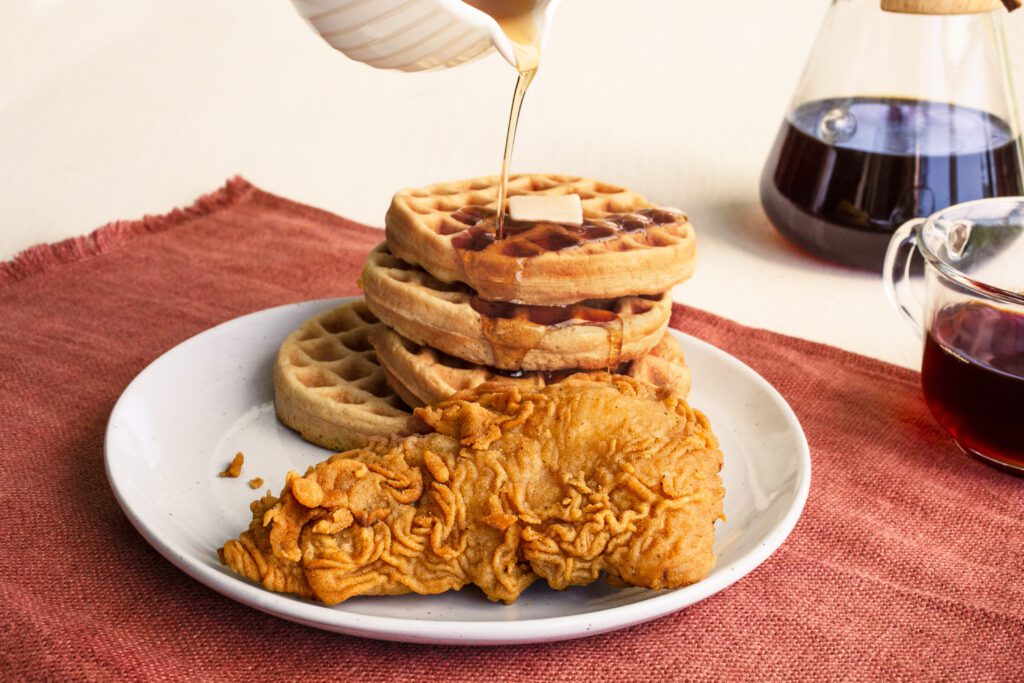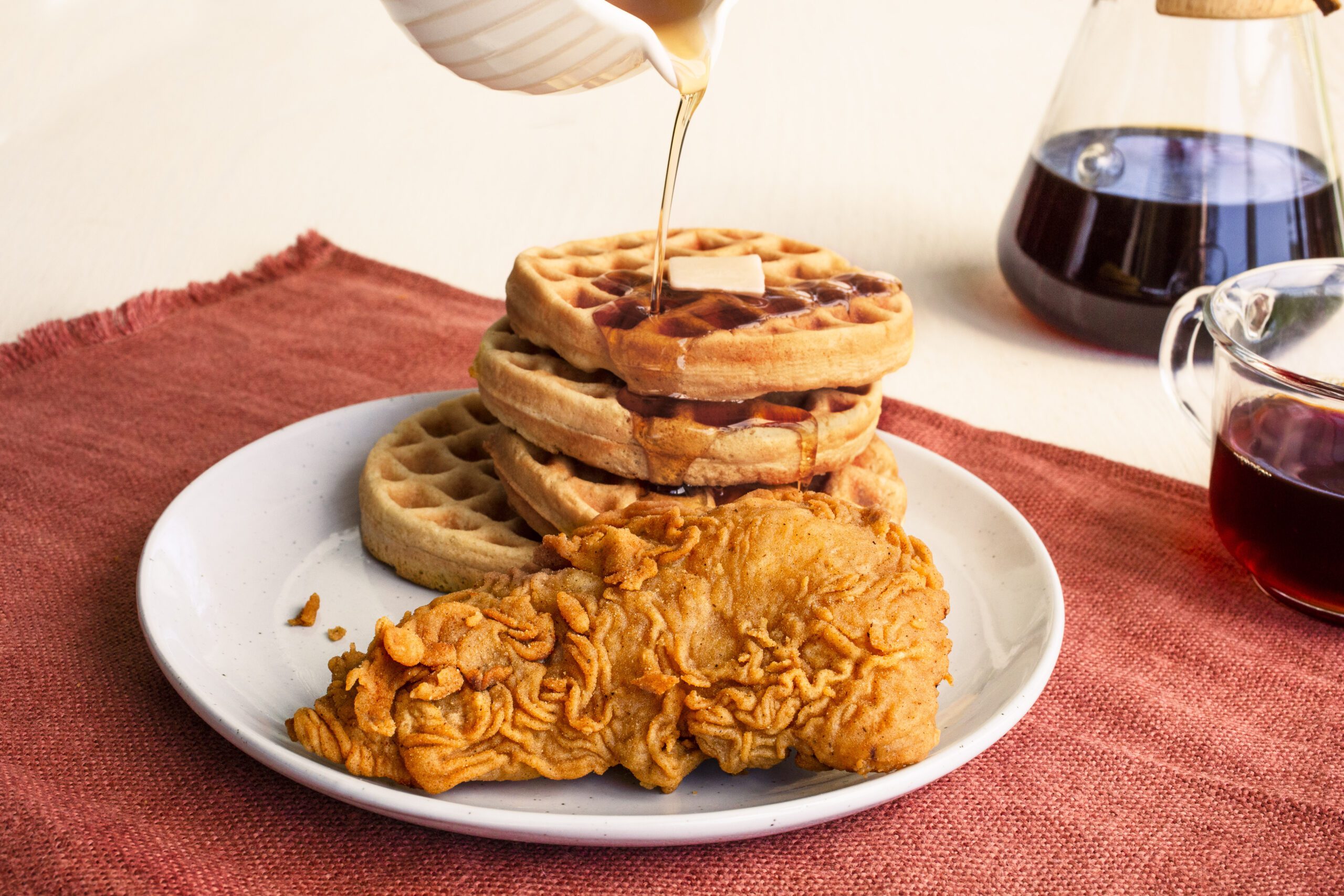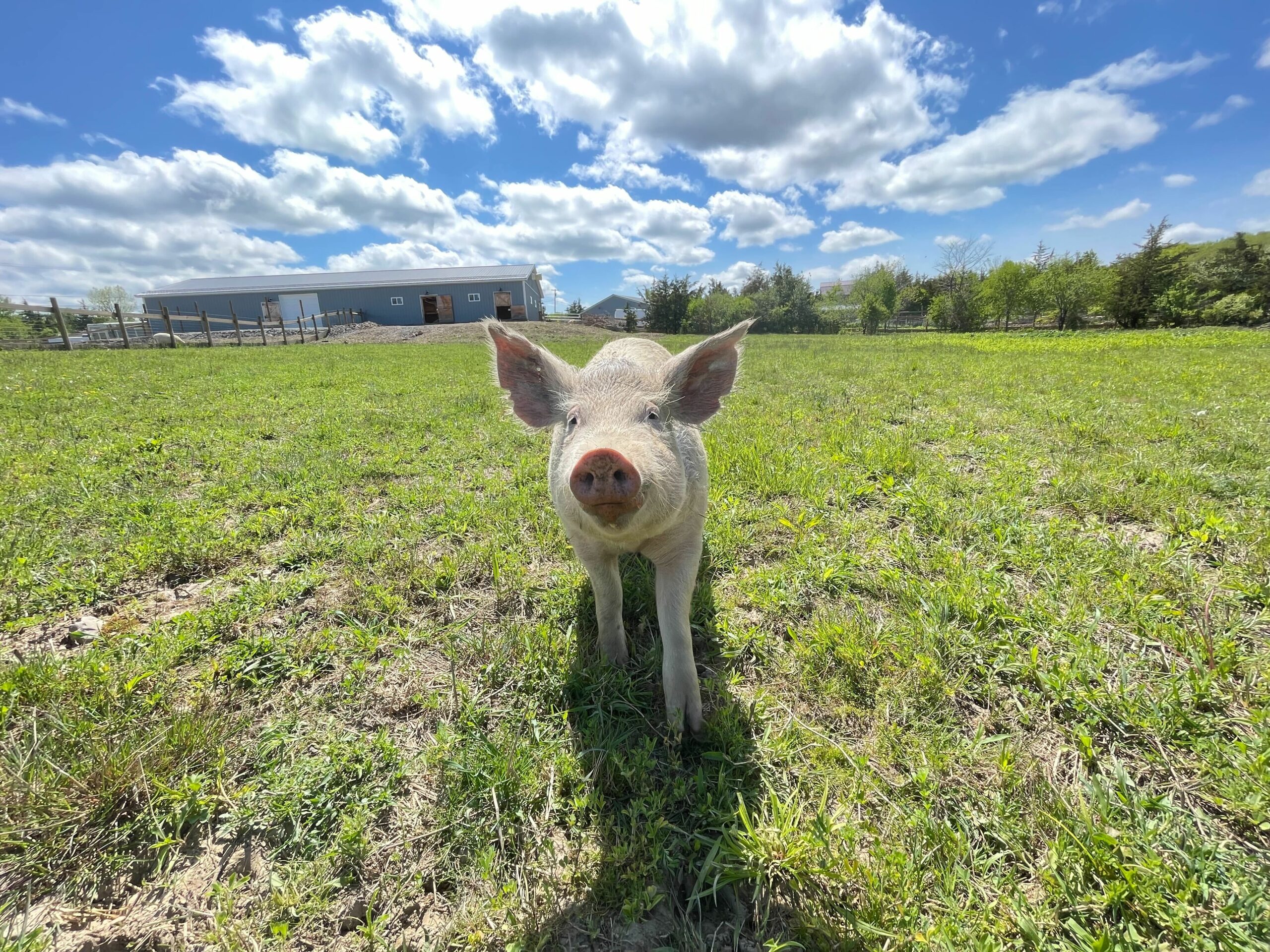
September 14, 2023
The Latest in Food and Ag Tech

The cutlet for this plate of fried chicken and waffles did not come from a chicken raised on a farm: it was produced via cell-culture in a lab. Upside Foods, a Bay Area biotech, recently made history by being the first company to receive both FDA and USDA approval to sell its cell-cultured chicken in the United States. Photo courtesy of Upside Foods.
Consumers have been seeking more sustainable as well as animal-free protein options in recent years, and advances in biotechnology led to the proliferation of plant-based meat alternatives we have available today. Companies developed meat substitutes with appealing flavors and textures that won over home cooks and diners, and these products are now mainstream: fast-food chains have plant-based burgers on the menu, and freezer aisles at major supermarkets are stocked full of “chicken” nuggets. The next frontier in the journey to attain a more sustainable food system is cell-cultured meats, or what’s been called “lab to table” foods—where desirable cuts of chicken and fillets of beef and fish are grown in a lab, sans bones, skin, fins, and feathers—and produced without the need for slaughterhouses.
Berkeley-based startup Upside Foods recently made history by being the first company to receive the greenlight from the FDA and approval by the USDA to produce and sell its cell-cultured chicken in the U.S. Today, the chicken is available in limited supply at the Michelin-starred restaurant Bar Crenn in San Francisco’s Marina District. Upside Foods’ recent approval was called a watershed moment for this burgeoning industry, which is projected to boom. A recent report forecasts the market for lab-grown meat to rise considerably by 2030 and majority of the innovation in this space is coming from California-based companies—nearly half of all VC money in the food and ag tech space in the U.S. goes to startups in California, with a majority in the Bay Area.
Several companies are making headway in the cell-cultured meat space, while others are creating even more options for plant-based proteins, innovating in sustainable agriculture, and using AI to discover beneficial bioactives in plants. Here’s a roundup of the latest news in food and ag tech from Biocom California member companies.
Fillet of Fish 2.0
Bluefin tuna is a prized delicacy at sushi restaurants, and it’s unfortunately been loved too much in recent years—an uptick in demand around the globe for the fatty fish contributed to it being overfished, leaving diners with the ethical dilemma as to whether or not they should order it. Finless Foods says we could have our toro and eat it, too, with its cell-cultured bluefin tuna that’s been in development—which the company says has a similar texture, taste, and nutritional profile of wild-caught tuna. The Emeryville-based startup made a big splash recently with an announcement that it’s in the final stages of submitting its prototype to the FDA and is hoping to receive regulatory approval in 2024.
Finless Foods is on Biocom California’s Food and Ag Tech Committee and participated in our federal policy team’s Energy & Agriculture Biotech Fly-In in Washington, D.C., to meet with high-level regulators and legislators on major policies, including the President’s Biotechnology and Biomanufacturing Initiative and the reauthorization of the Farm Bill. The company also hosted Congressman Scott Peters at their headquarters this month to discuss Farm Bill priorities.
When There is a Will There is a Whey
For people who are lactose intolerant or prefer not to consume cow’s milk, there’s a plethora of alternatives available ranging from oat to macadamia nut and soy. Perfect Day, a Berkeley-based biotech, says most plant-based milks can’t replicate the viscosity and flavor of cow’s milk, especially when baking or needing to steam it. The company invented an animal-free whey (a traditional dairy protein) via fermentation in tanks using microflora that results in a consistency identical to cow’s milk. The company partnered with national food purveyors that use the whey to make vegan-friendly ice cream and milk alternatives that are sold in stores nationwide, such as Bored Cow milk and Brave Robot ice cream.
Bring Home the (Cell-Cultured) Bacon
Some carnivores might shy away from putting a purely plant-based deli meat in their sandwich for lunch, but Mission Barns came up with what it says is a tasty, yet still sustainable, compromise. Its line of bacon, meat, and sausage is made from a blend of plant protein with cell-cultivated pork. The San Francisco-based company derived cells from one single donor pig (named Dawn) and uses the cultivator sample to add pork fat and flavor to its products. Laura Burch, communications director for Mission Barns, says they are awaiting regulatory approval to launch their products in the marketplace and are able to produce enough meatballs and bacon at their pilot plant to supply a handful of retailers and restaurants once they receive authorization. “Our mission is to cultivate meat for a more sustainable food system,” Burch says. “Our platform allows us to make products from pork, beef, chicken, duck, and other species, and we are starting with cultivated pork which is one of the most desirable and delicious meat flavors as well the largest meat category in the global market.”
Burch notes that Dawn lives happily at Sweet Farm, a climate sanctuary in upstate New York.

Mission Barns is a San Francisco-based biotech that pioneered a line of bacon, sausage, and deli meats made from a blend of plant-based protein and cell-cultivated pork. The cells were derived from one single donor pig named Dawn (pictured above) and the cultivator adds pork fat and flavor to the products. The company is awaiting regulatory approval to sell its products to consumers, and says Dawn lives happily at Sweet Farm, a climate sanctuary in upstate New York. Photo courtesy of Mission Barns.
New Wave Charcuterie
Another key player in the alternative deli meat space, Prime Roots raised $30 million in Series B funding earlier this summer, and plans to increase production of its meat alternative derived from koji mycelium, fungus threads that it says mimics the texture of traditional deli meats. The products are sold in stores and delis from Los Angeles to Seattle, New York and Hawaii’s Big Island, and include oven-roasted Koji Turkey, ham seasoned in the traditional German Black Forest style, and charcuterie “meats” of salami, smoked bacon and even pate.
High-Tech Foraging
Brightseed has been garnering media attention for its proprietary AI platform, called Forager, that it uses to find existing bioactive compounds in plants that may be beneficial in developing medicine and food products, including hemp. The South San Francisco company was named an editor’s pick in Forbes AI 50 in 2022 and is planning on cataloging 60,000 plants. Earlier this summer, the company announced a partnership with Blue Diamond to research the bioactive compounds in nonpareil California almonds and their potential health benefits.
Building New Partnerships Global pharmaceutical and biotech
Global pharmaceutical and biotech company Bayer recently forged strategic partnerships in the agricultural technology space. Earlier this year, the company announced a collaboration with Kimitec to develop biostimulants and crop protection solutions; and last year it closed a multi-year deal with Gingko Bioworks to research and develop new methods of nitrogen optimization, carbon sequestration, and next-generation crop protection.
Biocom California’s Food and Ag Tech Committee is holding its next meeting virtually on September 21 at 3:30 p.m. If you are affiliated with a food and ag tech company and interested in attending or learning more about joining our committee, please contact Brandon Jenkins Program Manager, Bay Area.